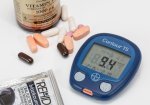High Blood Pressure Meds Revisited
By Mike T. Norris
Discussing high blood pressure meds and cancer, during pregnancy, side effects and weight gain caused by medications such as Vasolidators.

High blood pressure which is known medically as hypertension is a serious illness often called a 'silent killer' due to the general lack of symptoms until an advanced stage. This makes high blood pressure treatment extremely important and urgent. This article discusses key issues of concern by hypertension patients of high blood pressure meds.
High blood pressure treatment is not only accomplished by pharmacological drugs. It is also addressed using natural hypertension remedies such as foods that lower blood pressure, natural high blood pressure diuretics and following a special hypertension diet. This article will discuss selected high blood pressure medications. The following is a summary list of high blood pressure meds;
- Diuretics
- Beta-Blockers
- ACE Inhibitors
- Vasolidators
- Calcium Channel Blockers
- Peripherally Acting Alpha-Adrenergic Blockers
- Angiotension II Antagonists
- Centrally-Acting Alpha Adrenergics
High blood pressure meds: DIURETICS
Diuretics are the most commonly used high blood pressure meds. there are considered the first line of treatment for many hypertensive patients. They are available under a wide range of generic names including Torsemide, Furosemide, Indapamide, Metolazone and Chlorothlazide. Brand names for diuretics include Enduron, Lozol, Saluron, Diuril and Demadex.
Diuretics are also known as 'water pills' because they function by actively excreting excesses fluids from the bloodstream, This is designed to reduce blood fluid volume which has a positive impact for patients. Diuretics may not be suitable for persons with certain ailments such as kidney and liver problems. Pregnant and nursing women should also avoid diuretics as they can be transmitted via breast milk. The following are known side effects of diuretics;
- Unstable stomach
- Muscle cramps due to loss of potassium
- Headache
- Frequently feeling thirsty due to loss of water
- Frequent urination
- Dizziness
Individuals with urination problems should also consult their doctor as diuretics put pressure on urination system through repeated restroom visits. Patients should also approach their physicians immediately should they notice signs such as severe rush, problems breathing or swallowing and gout medically known as hyperuricemia.
Anti-hypertensive medications: BETA-BLOCKERS
Beta-blockers are a common recommendation for certain patients according to hypertension guidelines that are issued to doctors by hypertension institutions. Examples of these institutions include the American Heart Association (AHA), British Hypertension Society (BHS) and the European Society for Hypertension (ESH).
Common Beta-blockers brand names include Coreg, Corgard, Levatol, Sectral, Trandate and Zebeta amongst many others. Known generic names include Timolol Nadolol, Atenolol and Pindolol. Beta-blockers target certain nerve impulses. They curtail the transmission of these impulses which also have implications on the relaxation of blood vessels and heart rate.

Beta-blockers are not only designed to be high blood pressure meds. They are also used to treat heart failure, angina pains and control abdominal heart rhythms of a certain nature. This is medically known as arrhythmias. Other conditions also treated are migraine attacks, anxiety and glaucoma. In much the same way as diuretics, beta-blockers have specific risks when used by persons with kidney or liver problems. This will also include people with asthma, diabetes or overactive thyroid.
This particular high blood pressure medication is not to be used by individuals with slow heart rate, heart block or shock. Pregnant women and nursing mothers should seek counseling from their physician before commencing use of the medication. The following are known side effects of beta-blockers;
- Being constipated or having diarrhea
- A feeling of being lightheaded
- Unstable stomach
- Feeling exhausted/tired
- Dizziness
- Headache
Patients should contact their doctor at once should the following signs present i.e chest pain, slow or irregular heartbeat, swelling in the hands, feet or legs and problems breathing. Irregular heartbeat can be checked by using special home blood pressure monitors such as the Omron blood pressure monitor series.
High blood pressure meds: ACE Inhibitors
ACE inhibitors are not encouraged for women who are pregnant of nursing breast feeding infants. Women who are pregnant and have high blood pressure are known medically as having Gestational hypertension. Those in this category will need to consult their doctor or physician. Individuals with kidney or liver problems, diabetes or heart problems are also instructed to approach their doctor before starting to take ACE Inhibitors. Patients already taking diuretics should also speak to their doctor before starting on ACE Inhibitors.
ACE Inhibitors work by targeting blood vessel constriction and relaxation. This determines the amount of blood that will be allowed through the vessels. This directly affects blood pressure.Common side effects of ACE inhibitors include the following;
- Feeling exhausted/tired
- sleeping problems
- Increased heart beat
- Dizziness
- Coughing
- Headache
Significant warning signs of ACE Inhibitors that should be reported immediately to a doctor include swelling in the face, eyes, lips, tongue and legs, chest pain and problems breathing or swallowing.
Anti-hypertensive medications: VASOLIDATORS
Many people taking high blood pressure medications are concerned about their effect on their weight. In particular, vasolidators sold under brand such as Cardura, Minipress and Hytrin are known to cause sudden weight gain as a side effect. Vasolidators are not to be used by individuals who are also taking bisulfates. This will also include individuals taking diuretics, insulin, phenytoin, corticosteroids, estrogen, warfarin, or progesterone. Individuals in this group should talk to their doctor before taking the drug.
Warning signs that must be reported to the doctor at once when taking vasolidators include the following;
- Sudden weight gain
- Fainting
- Chest pain
- Fast heart beat
- Fever
- Problems breathing
The following is a list of known side effects of vasolidators;
- Unstable stomach
- Body hair growth
- Dizziness
- Headache
- Low blood pressure - hypotension
Blood pressure medications are in many cases administered in combo. This means doctors can combine different types of drugs for a specific patient in order to address their particular unique circumstances. Abandoning hypertension treatment mid-way or without consulting a doctor is one among factors causing resistant hypertension. Hypertension patients still suffer side effects despite the mix of drugs. It can be noted that side effects found in the different hypertension medications above will not necessarily present all at once in a single patient.

Return to Articles On Hypertension from High Blood Pressure Meds
Return to Hypertension Home Page from High Blood Pressure Meds
Disclaimer
Information contained on this website is not meant to replace your doctor's advice.
(c) All Rights Reserved. 2010-2018











